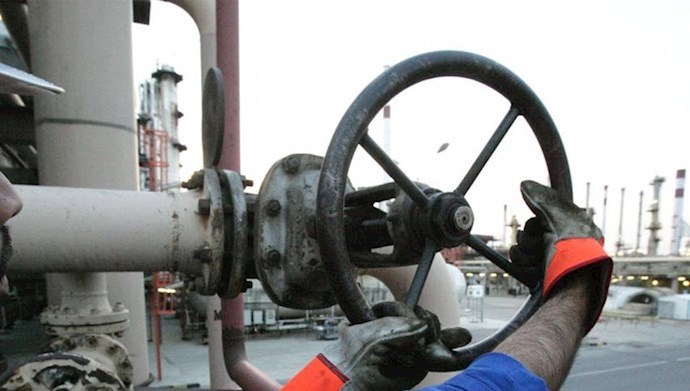Analysis by PMOI/MEK
Iran, August 4, 2020—The workers of several refinery and oil industry centers in southern Iran, including Abadan, Mahshahr, Gheshm, Parsian, and Soutern Pars started a fresh round of strikes on Saturday, August 1. The People’s Mojahedin Organization of Iran (PMOI/MEK) tweeted on August 2 that the workers of the Phase 14 (South Pars natural gas project), Bushehr, and Asaluyeh have joined the strikes launched by their colleagues in the oil, natural gas and petrochemical industry, which continues to this day.
The oil industry workers demand what all the hard-working workers of Iran are demanding amid though economic pressure caused by the regime’s corruption and mismanagement. Seven million unemployment workers are chanting “We are starving.” Even workers who do have employment are getting wages that are four times less than the poverty line.
Regime’s misuse of sanctions to loot and suppress the workers
Iranian regime Supreme Leader Ali Khamenei and President Hassan Rouhani have mobilized their propaganda machines to justify the society’s critical conditions by blaming U.S. sanctions. But the Iranian workers are reminding in their protests that even at when Iran earned $700 billion from oil revenues before the sanctions, and even after it received $100 billion dollars freed assets after signing a nuclear agreement with world powers, Iran’s workers had received nothing but poverty and misery. Before and after the sanctions, the one thing that remained constant in the lives of Iran’s labor community was the mullahs’ lootings and corruption.
One example of mullahs’ expenditure for its proxies
In a recent speech, Hassan Nasrallah, the leader of the Tehran-backed terrorist group Hezbollah, while praising regime’s dead terrorist mastermind Qassem Soleimani and said: “The Iranian government always paid us every month but the last time ‘Haj Qassem’ came to Beirut he paid us the money of four months at once.”
During the sanctions, the regime did not even reduce its support for its proxies and suppressive forces. These budgets were in fact increased more than ever before. Although when it comes to the Iranian workers and people, the regime uses sanctions as an excuse to not pay them. The regime punishes Iranian workers to carry on its vicious policies of seeking nuclear weapons and exporting terrorism and conflicts to other countries that have led to these sanctions. Instead of using hundreds of billion dollars under the control of financial institutions affiliated to Khamenei to pay Iranian workers’ wages and unemployment insurance, the regime fires workers or refuses to pay their already limited salaries. And if the workers protest, their answer is dismissals, arrests and suppression.
A turning point in workers’ protests
The workers, from those of the Haft-Tappeh Sugar Cane Factory to the Heavy Equipment Production Company (HEPCO), have escalated their protests recently. The meaning of the oil industry workers’ strikes—which if they continue will be supported by all oil industry workers across the country—is that workers will no longer tolerate the regime’s vicious policies. In their protests they are clearly chanting that they will not accept injustice.
Iranian workers no longer have anything to lose and this is a dangerous situation for the regime. Many of the regime’s experts and insiders are warning about the society’s explosive situation. Mohammad Ali Vakili, a former member of the Majlis (parliament) presidium said on August 1, to the state-run Ebtekar daily, that people’s living conditions are poor and have reached a warning point. “Reaching the boiling point means the workers’ movement have surpassed the protests phase,” he said with deep concerns.
“We must wait for various social [unrests] and revolts… What I mean by this is what happened in December 2017 and November 2019. If the establishment fails to handle the people’s despair regarding their economic dilemmas, we must brace for the consequences and other events…” said Amanollah Gharayi Moghadam, a sociologist close to the regime, in an interview on August 1 with the state-run Setareh Sobh daily.
Iranian opposition President Maryam Rajavi, head of the National Council of Resistance of Iran (NCRI), hailed the protesting workers in Abadan, Qeshm, Parsian, Lamerd, Mahshahr and South Pars, emphasizing that the oppressed workers have rightfully risen in demand of their wages and pensions that have been plundered by the mullahs' regime.
"Hail to the workers of refineries in Abadan, Qeshm, Parsian and Lamerd who have launched a strike to gain their rights. Iran’s oppressed workers are using strikes and protests to restore Iranian workers’ rights plundered by the mullahs’ inhuman regime," Madam Rajavi tweeted.
"Iran regime compels workers to toil under oppressive contracts, without paying their salaries. Simultaneously, the country’s assets are wasted in nuclear and missile projects, and on terrorism, or invested in foreign bank accounts of the regime officials and their families."





